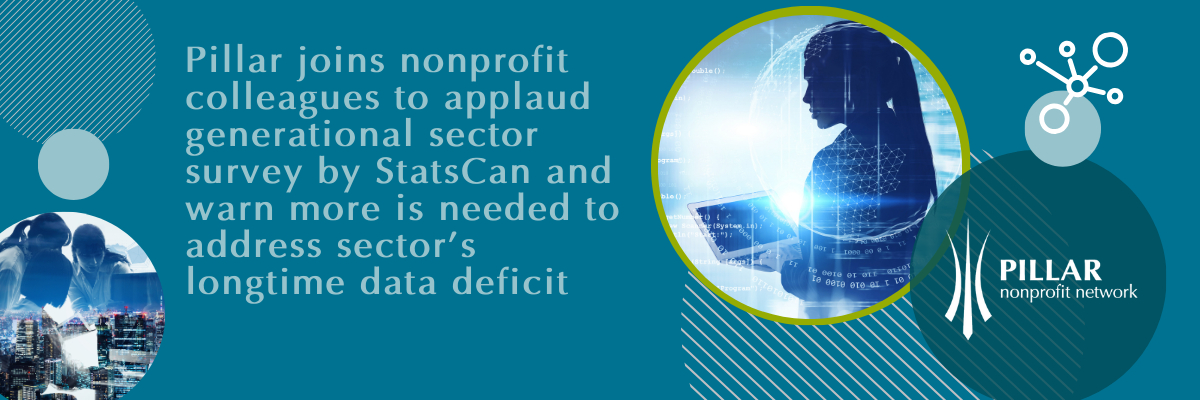
LONDON, Ontario, April 25 -- Pillar Nonprofit Network has joined colleagues in the Federal Nonprofit Data Coalition in co-writing and co-signing a statement applauding Statistics Canada for its generational survey of the nonprofit sector, but warning it will take more than that to close a persistent nonprofit data deficit.
On March 20, 2024, Statistics Canada released data on the nonprofit sector collected through a special module of the Canadian Survey of Business Conditions. This is the first time since the 2003 National Survey of Nonprofit and Voluntary Organizations (NSNVO) that Statistics Canada has conducted such a large-scale survey of the sector. Although this survey is significantly smaller in terms of its scope and sample size than the NSNVO, it gives us crucial insights that we haven’t had in 20 years. These insights include that 55% of the sector is made up of organizations with no paid staff and that nonprofits make up a slightly larger proportion of the sector than registered charities. The survey also provides information on leadership diversity, organizational finances, who the sector serves, and more.
Despite its huge social and economic contributions, our sector has long faced a data deficit. This new data will help governments, funders, researchers and nonprofits understand some of the key features of our sector and help us make better strategic, funding, labour force and public policy decisions.
We are grateful to Statistics Canada for collecting this data and working with the sector through an external advisory committee to ensure the survey met the sector’s needs. We are also grateful to everyone in the sector who advocated alongside us for this data, and to Senator Ratna Omidvar for her enduring engagement on sector data issues.
However, we also want to highlight that major data collection on the sector shouldn’t be a once-in-twenty-years occasion. For instance, without regular data collection between 2003 and 2024, it is hard to determine the impact the COVID-19 pandemic had on some key data points. Additionally, this data release just begins to address the sector's data needs; to cite one example, there is still no publicly available list of all nonprofit organizations in Canada.
We, the undersigned members of the Federal Nonprofit Data Coalition, urge the government to continue to work with the sector to address our data priorities, as outlined in our coalition’s 2024 pre-budget submission.
As organizations:
- Ajah
- ANSWER.it Inc
- BGC Canada
- Canadian Centre for Policy Alternatives
- Capacity for Impact Consulting
- CCVO (Calgary Chamber of Voluntary Organizations)
- Circle on Philanthropy
- Community Sector Council Newfoundland and Labrador
- Edmonton Chamber of Voluntary Organizations (ECVO)
- EmbraceHealthFoundation
- Foundations Learning & Skills Saskatchewan
- GIV3
- Imagine Canada
- Ontario Council of Agencies Serving Immigrants (OCASI)
- Ontario Nonprofit Network
- Philanthropic Foundations Canada
- Pillar Nonprofit Network
- Resilient Kids Canada
- SETSI
- Sherry Baker & Associates
- Skills for Change
- Tamarack Institute
- Toronto Arts Council
- Toronto Arts Foundation
- Vantage Point Strategies Society
- Volunteer Benevoles Canada
- YWCA Toronto
As individuals:
- Bruce Martin, PhD. Thompson Rivers University
- Dr. Jacqueline Musabende
- François Brouard, Sprott School of Business, Carleton University
- Matthew Russell (PolicyWise for Children & Families)
- Nathan Grasse, School of Public Policy and Administration, Carleton University
